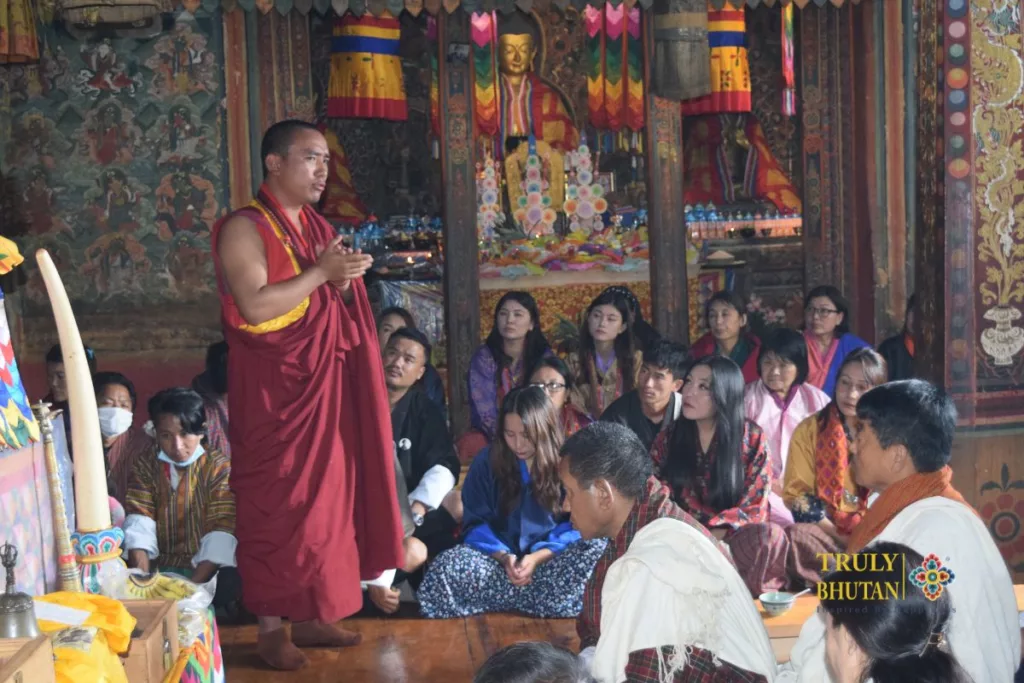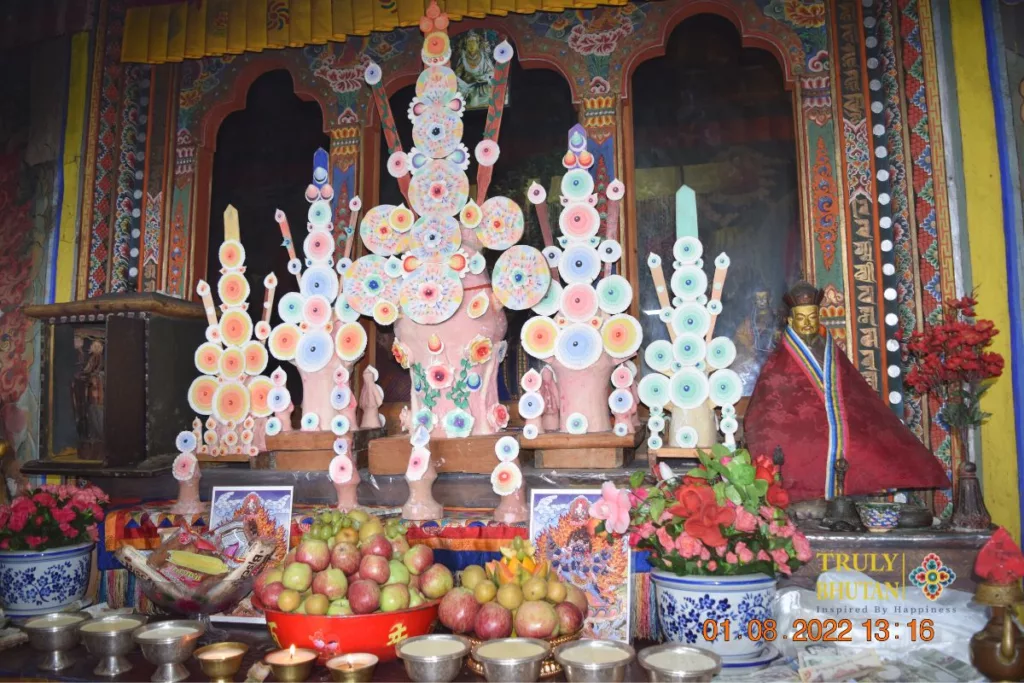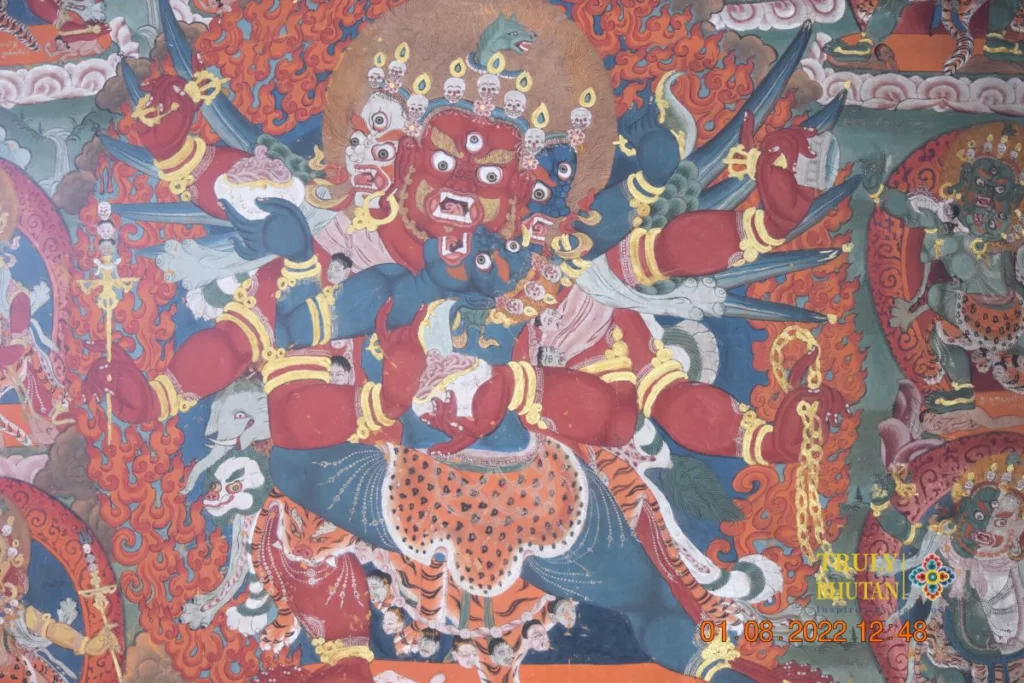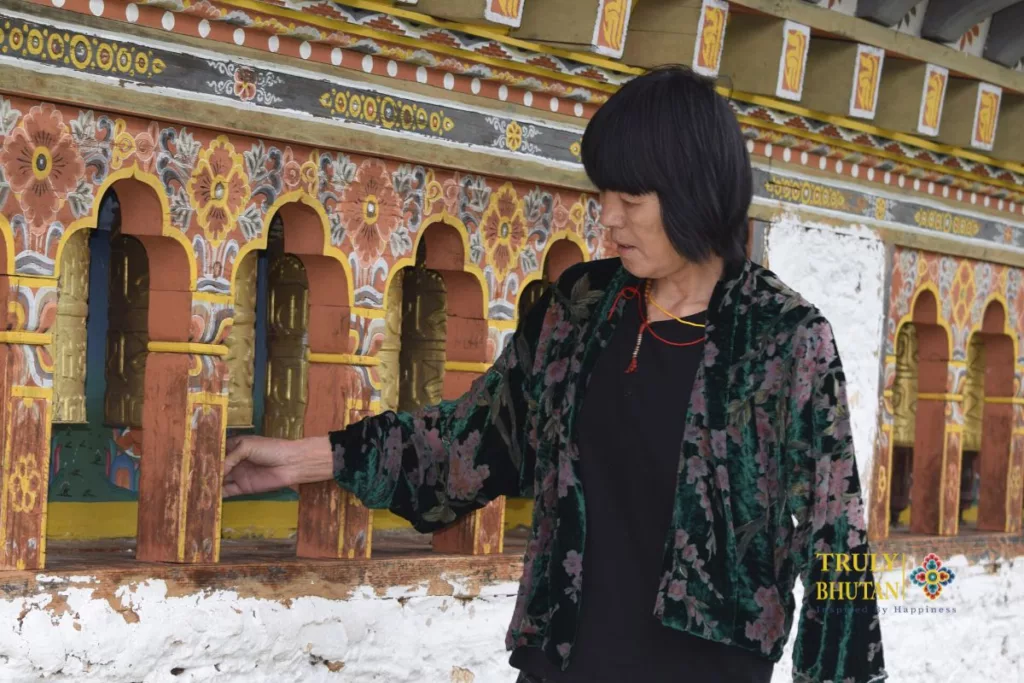Published on: August 30, 2022, by Aue Therchen
I have had the privilege to visit Bhutanese houses; both modern-day flats displaying several characteristics of development and huts where families live in just two rooms. The difference is stark. However, there is always one common element – every house has an altar, with different statues and water offerings made.
A landmark of Bhutan and Thimphu especially in the 13th-century Changangkha Lhakhang founded by Nyima, one of the sons of Phajo Drugom Zhigpo, who first introduced the teachings of the Drukpa Kagyu tradition of Himalayan Buddhism to Bhutan. You can visit the monastery any day and amidst the old and young, you will see couples with their newborns at the monastery. They are there to seek the blessings of the region’s deity, for it is believed that every child born at the Jigme Dorji Wangchuck National Referral Hospital (JDWNRH) in Thimphu needs the deity’s blessings.

If you are planning to visit the Dechenphu monastery in Thimphu, the sacred home of Geynyen Jagpa Melen, Bhutan’s protective deity, never do so a day before schools in Thimphu conduct their examinations. You will simply be unable to drive to the monastery because of traffic jams caused by the hundreds of students who visit the monastery seeking the deity’s blessings for their examinations.
Buddhism is the State’s religion and also spiritual heritage of the country
The above are a few examples of how Buddhism has diffused immensely in the psychic of the Bhutanese people, shaping the people’s thoughts, beliefs, conduct, and thus the way of life. In other words, Buddhism has become an integral component of how Buddhists in Bhutan live. I say Buddhist, for there are people of other faiths like Hindus and Christians in Bhutan. Neither is Buddhism the State’s religion. It is the spiritual heritage of the country. However, with the majority of the people practicing Buddhism, it has shaped the way Bhutanese live.
This impact stands out the moment a new day begins. Even before a sip of water or tea, water offerings to the deities are made on the altars. Butter lamps are offered and incense is lit. Many may not know the significance of this daily ritual, but it has become the first page of the day for the people.
Popular Sacred places in Bhutan
Who brought Buddhism to Bhutan?

Vajrayana Buddhism Beliefs
Historical accounts say that Buddhism was first introduced to Bhutan by the Tantric Master and Great Teacher, Guru Padmasambhava, who came to Bumthang in the 8th century at the request of the region’s then King, Sindhu Raja. Before that, people practiced Bonism, which is still alive in some pockets of the country.
After Guru, several Buddhist masters visited Bhutan from Tibet, while Bhutan also had its share of masters, such as the Great Treasure Reveler (Terton) Pema Lingpa. The coming of Zhabdrung Ngawang Namgyel in 1616 is a significant epoch in Bhutanese history from different premises. Drukpa Kagyu gradually became the dominant school, while the Nyingmapa School also existed. Today, Bhutan is the last bastion of Vajrayana Buddhism.
Vajrayana Buddhism in Bhutan
However, how has Buddhism fashioned the Bhutanese way of life? The answer is clear – beliefs that are said to be in Buddhist canons derived from the teachings of several masters which direct one’s actions, thoughts, and conduct. Some may call it superstitious. However, when beliefs, even irrational ones are passed down centuries and practiced by a majority, there is no other alternative but to believe, which gradually translates into one’s part of life. You need not mull over anything; the fact that every house, even those with just two rooms has an altar with statues/idols of deities says a lot.
In hindsight, Bhutan and its laws, are based on Buddhism
Zhabdrung Ngawang Namgyal promulgated the first set of Bhutanese laws, the codification of which was completed in 1652. The Code that serves as the foundation of the contemporary Bhutanese legal system is based closely on Buddhist principles and addressed the violation of both temporal and spiritual laws. These laws contain specific reference to the ten pious acts, known as Lhachoe Gyewa Chu, and the sixteen virtuous acts of social piety referred to as the Michoe Tsangma Chudrug. Thus, when laws themselves are based on Buddhist tenets, the influence on the life of Bhutanese needs no elaborations.
The bodhisattvas are Buddhist teachers in Bhutan.

Religious beliefs shape the kinds of values that people hold. It can be social values such as women’s roles, the nature of good and evil, morals, ethics, empathy, compassion, and others. The Buddha emphasizes the positive role a woman can and should play as a wife and a good mother. Buddhism says that both husband and wife are expected to share equal responsibility and discharge their duties with equal dedication. Additionally, women, such as Khandro Yeshey Tshogyal and Khandro Mendarawa, apart from other consorts of Guru Padmasambhava played vital roles in the life of the Guru. Buddhism talks about several Dakinis. Thus, if Bhutan is today a country where gender parity exists, as compared to other countries, it is because of the above factors, which celebrate womanhood.
Importance of spiritual heritage in Bhutan.

Time is important but there may not be a nation or people who are so concerned about the right time, as the Bhutanese. It is yet again associated with Buddhism and nothing important is done without the assistance of astrology. From lying in the foundations of a new house to moving into a house, celebrating a promotion; leaving for a long destination; you just name it. The time has to be auspicious.
For instance, the second day of every month in the Bhutanese calendar is one when one should not plan for a long journey. However, if one has to move on that particular day, there is a remedy, from the Buddhist canons. You could fake your journey a day earlier; pack all things required and just drive for a short duration and return.
Buddhist Beliefs & Practices
While the above are ways in which Buddhism has shaped the way one lives, there are special days, which are government holidays, which further augment the Buddhist within. All-important events of the Buddha, from his enlightenment to attaining Nirvana, are national holidays. Moreover, almost everyone visits monasteries, lights butter lamps, and offers their prayers on these special days. By doing so, the Buddhist knot is further tightened.
Similarly, the birth anniversary of Guru Padmasambhava is a festival celebrated all across the country. People adorn their best dress, pack the best dishes and join in the festive, which includes the performances of mask dances. It is a three-day religious festival, and all the different mask dances performed have a story; such as Judgment Day.
Visitors to Bhutan may hear cymbals beaten, religious trumpets blown and monks chanting prayers as they go around villages. Though all Bhutanese have accepted modern medicine, they have not yet shed seeking divine intervention. Through prayers, the Buddha of medicine and other deities are still invoked.
Popular Upcoming Events and Festivals in Bhutan
Find more about popular upcoming festivals and events in Bhutan in 2022 and 2023. Learn below about Bhutan’s most celebrated religious Tsechus, as well as dates and key attractions of Bhutan.
These are temporal religious rituals undertaken when the situation demands. On the other hand, every Bhutanese Buddhist conducts their annual religious ceremony. No matter what, this is something that has to be done, to appease their protecting deities, and invoke the Goddess of wealth and others.
The influence of Buddhism is widespread
Shaping the thoughts of the people has swayed the actions and thus conduct of the people. Some are abstract, while others can be seen. And the number of religious structures such as stupas and monasteries seen along highways and mountain peaks; prayer flags fluttering are again testaments of how far Buddhism has touched and translated the Bhutanese way of life.
It is also not a surprise that several articles of the nation’s sacred constitution, the mother of all laws, are based on Buddhist precepts. The ones that stand out are the responsibilities of the state to ensure that every Bhutanese is entitled to free basic education and medical care. Bhutan is not a rich country for such policies. Nevertheless, in the battle between economy and Buddhism, the latter triumphed; just as it has in many other areas, swaying the lives of Bhutanese immensely.
